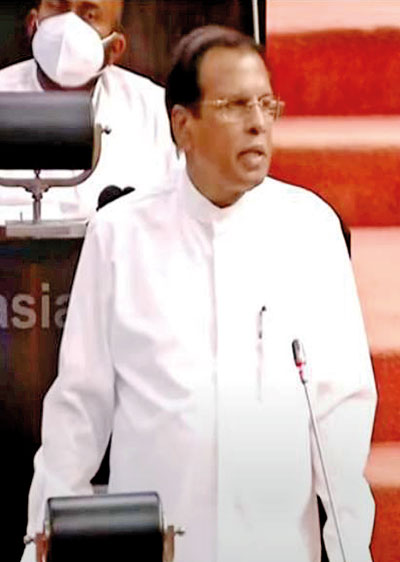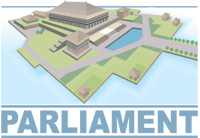News
CoI debates cause tensions in Parliament while Sirisena defends himself
View(s):Those who claim he had prior knowledge about the Easter Sunday attacks but did nothing to prevent them have “a mental problem” former President Maithripala Sirisena said on Friday, as he defended himself during the Parliamentary debate on the Commission of Inquiry (CoI) report into the attacks.
In an hour long speech to the House during the third day of the debate into the CoI report, Mr Sirisena, now a Sri Lanka Podujana Peramuna (SLPP) MP, claimed that some members of his then Government, the Opposition and the media had attacked him relentlessly and created a public perception that he knew about the attacks but did not take action to prevent them.

Former President Maithripala Sirisena in Parliament
He likened the public perception built up regarding him and his role surrounding the Easter attacks to the Goebbels’ Principles of Propaganda.
He noted that an arrest warrant had been issued for Zaharan Hashim, the alleged ringleader of the attackers, in 2017. “There are many persons who have warrants out for their arrest. It is the responsibility of the police to arrest them, not the President. The security forces should have acted against Zaharan after taking his past activities into account.”
While information regarding an impending attack had been received on several occasions from the beginning of April, 2019, none of that information had been conveyed to him, Mr Sirisena insisted.
He stressed that there is no mention anywhere in the evidence recorded in the CoI report that he received prior warnings about an impending attack.
“If I received such information I would never have let such a tragedy occur. What sort of President would allow such a calamity to befall his country if he knew it was going to happen? I knew nothing of this. If someone says I did, they have a mental problem.”
He called on the Government to quickly prosecute terror suspects now in custody over the attacks. “We must find out those who were behind these heinous attacks. Those who sponsored them must be found too,” Mr Sirisena said.
While the CoI report contains some truths, the Commission has also reached wrong conclusions based on them, National People’s Power (NPP) Leader Anura Kumara Dissanayake said. “There are also many matters that the Commission should have gone into, but these facts have been hidden or have disappeared.”
Mr Dissanayake added that it was difficult to believe that Muslim political leaders in Parliament did not know that a section of their community had gravitated towards violent extremism. “The Muslim political leaders in Parliament gave scant attention to this issue. They turned deaf ears to the danger such emerging extremist groups could pose to wider society because they believed that they could use the conflict between the Sinhalese and Muslims to further their own political agendas.”
He added the then Government had to take collective responsibility for failure to prevent the attack.
Nevertheless, there were still unsolved issues related to the attack, he stressed. On paper, it appears to be a barbaric Islamist terror attack. “However, if we look at the sequence of the attacks, the methods employed and the ultimate results, it shows that this was a political attack. I say this because of the great political upheavals that took place in the country following these attacks.”
Mr Dissanayake opined that the Commission had not satisfactorily investigated the attackers, their motives, those who aided them, the political hands behind them and the masterminds who were ultimately at the top of the network.
The NPP Leader questioned why Naufer Moulavi, the alleged theoretician of Zaharan’s terror group, who is now in police custody, was not called before the Commission to give evidence. He also alleged that there had been an attempt to mislead investigators probing the killing of two police officers in Vavunathivu in 2018, during the time of the 52-day Government that came to power following the Constitutional coup.
 “We now know that this was the first terror attack by Zaharan’s group. But back then, police arrested a rehabilitated former LTTE cadre over the killings. Several days after his arrest, intelligence agencies tipped off the CID that a discarded jacket is there near the scene of the crime. A sniffer dog deployed by the CID to check the jacket led them to the house of the arrested former LTTE cadre. This clearly showed that there was an planned attempt to mislead the investigation into the killings and prevent investigators from finding out about Zaharan’s first act of terror.”
“We now know that this was the first terror attack by Zaharan’s group. But back then, police arrested a rehabilitated former LTTE cadre over the killings. Several days after his arrest, intelligence agencies tipped off the CID that a discarded jacket is there near the scene of the crime. A sniffer dog deployed by the CID to check the jacket led them to the house of the arrested former LTTE cadre. This clearly showed that there was an planned attempt to mislead the investigation into the killings and prevent investigators from finding out about Zaharan’s first act of terror.”
Mr Dissanayake noted that the planned attack on hotel Taj Samudra did not take place. The bomber who was at the hotel is then seen taking a call to someone, but no intelligence or law enforcement agency have found who he had called. “Meanwhile, even as the bomber was making his way to Dehiwala, a member of military intelligence goes to the bomber’s house and questions his wife. How is it that mere hours after the first attacks, whilst the CID was still trying to figure out what was happening, a member of military intelligence found his way to the house of one of the bombers? We need answers on that.”
The MP further noted that the Islamic State (IS) did not claim responsibility for the Easter attacks till many hours after they took place.
“We know that a member of Zaharan’s group, who is also in custody, took a phone call to an IS spokesman in Indonesia and implored him to claim the attacks on behalf of IS. According to a IMEI number provided by a foreign intelligence agency, he then got a call from someone in Malaysia demanding that he make sure that IS takes responsibility for the attacks. IS refused to take responsibility for the attacks until Zaharan’s group put out a video pledging allegiance to them. The CID told the Commission who the phone that was tracked through the IMEI number belonged to, but they evicted the media before doing so. This Parliament must know who was the person who called the member of Zaharan’s group and pressed him to make sure that IS takes responsibility for the attacks.”
There were also questions over the warning given by a foreign intelligence agency in the days leading up to the attacks, he added. “The warning on April 4 regarding an impending attack was extremely specific. It listed possible methods of attack and even named some of the perpetrators. However, the same intelligence source that gave such a specific warning did not provide any additional intelligence until the evening of April 20, warning of an attack the next day. On 6.00am on April 21, there was another warning from the same source that an attack will occur between 8.00am and 10.00am. However, in between, no intelligence was received about the attackers withdrawing Rs 47 million from bank accounts on April 7, about the bombers holding a farewell party on April 9, the test run conducted by blowing up a motorbike in Kattankudy or how explosives were transported there for the purpose, nor of explosives being transported on April 18 to a safe house in Panadura in preparation for the attacks. How is it that a close intelligence source that gave so many specific warnings failed to alert authorities on what happened in between. That also is deserving of answers.”
Mr Dissanayake pointed out that aside from former President Maithripala Sirisena and Archbishop of Colombo Malcolm Cardinal Ranjith, a large number of senior intelligence officers and security forces personnel who testified before the Commission had either hinted or stated openly that they suspected that there was a vast conspiracy behind the attacks and that an external hand was behind it. “If so many senior officers are adamant that there was a conspiracy behind this, then future investigations must focus on uncovering those behind it,” he asserted.
He warned that as long as those who were behind the conspiracy remained hidden, the country would remain insecure, “for these conspirators could launch such an attack at any moment in the future.”
The former Government did not move against Muslim extremists because rather than national security, it was more worried about its Muslim voter base, charged State Minister Dr Nalaka Godahewa. “The Government did not take steps to properly investigate 10 specific incidents in the lead-up to the Easter attacks due to this reason,” he claimed.
In its inability to distinguish ordinary Muslims from extremists, the then Government failed its Muslim voters as well, the State Minister added.
Samagi Jana Balawegaya (SJB) MP Harin Fernando received no end of criticism over his comments to the media after the attacks that his father had received prior warning about them. On Friday, wearing a black shawl and holding a Bible in hand, Mr Fernando said even today, he was happy about the comments he made since the CoI report proves his then claim that the Government was aware that an attack was coming.
Mr Fernando also pointed to allegations, not covered in the CoI report, that Zaharan had been paid by the State prior to 2014. “Who paid him till 2014? Did certain intelligence agents have any connections with him?” he queried.
SJB MP Mujibur Rahuman meanwhile, called on the Government not to use the Easter attacks as an excuse to trample on the rights of the Muslim community. “I have heard some Government Ministers talking about banning the Burqa, Madrassas and even the teaching of Arabic. Zaharan was thrown out of the Madrassa as he was an extremist and even his wife does not wear the Burqa. There are some two million Muslims in this country but only a handful among them were party to these terror attacks. Don’t victimise an entire community due to the actions of a handful,” he appealed.
Parliament will reconvene on April 5.


